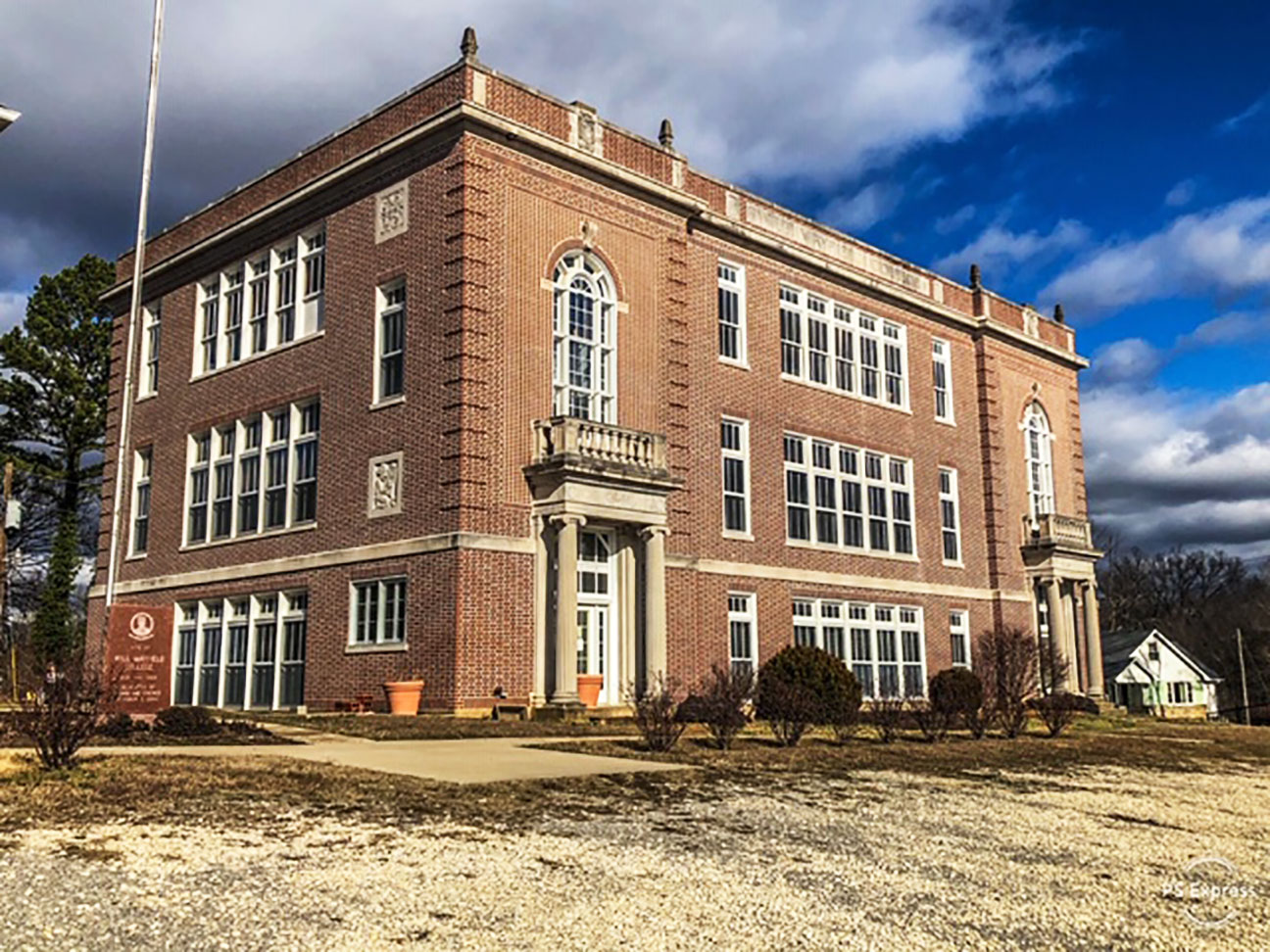Will Mayfield College
by Clint Lacy
The Will Mayfield College stands as a symbol of a once prosperous era for Marble Hill, Missouri. The small town of approximately 1500 people serves as the Bollinger County seat which lies in the Eastern Ozark foothills of Southeast Missouri.
“The area that would eventually become known as Marble Hill was established in 1842 as New California. Nine years later, it was renamed Dallas in 1851. As the area grew over the years, the First Baptist Church was built in 1856 near the oldest cemetery in Marble Hill. In 1862, the courthouse and town of Dallas was raided by Colonel S.D. Kitchen, along with 120 Confederate soldiers. Finally, in 1868, the name of the town was changed again, this time to Marble Hill, to prevent confusion with the already existing Dallas County.”(1)
The Will Mayfield College began as the Mayfield-Smith Academy in Sedgewickville (originally called Smithville), Missouri in 1878. In 1880 the school was moved to Marble Hill.
“The new campus was in a healthful location with “pure water” and “beneficial zephyrs.” In addition, it was free of the vice associated with larger towns. The first main building—Academic Hall—was completed in 1885. In 1903 the name of the school was changed to Will Mayfield College to honor the son of the founder.”(2)
The college was mainly known for producing teachers and at one point produced more teachers than any state college in Missouri. Though successful the college’s demise came in the form of a fire destroying the women’s dormitory in 1926 and later the Great Depression.
More information for the college can be found in a Department of Natural Resources application to the National Register of Historic Places which states:
“Allegations that the schools endowment was spent without authorization, coupled with debt and loss led to the temporary closure of the school in 1930. It reopened briefly but the deepening of the Great Depression in the early 1930s caused enrollment to drop. The school closed its doors after commencement ceremonies in May 1934. To cover debts the ownership of the school transferred to a bonding company in St. Louis. Franklin Hall, located several blocks from the college campus, was sold as a private residence. The Patton School District purchased the frame gym and moved it out of town and it is unknown if the building still exists.
The large campus (10 acres) was also parceled and portions sold. The school’s two classroom buildings, the Administration Building and the Arts and Science Building, sat empty for several years until purchased in 1941 by Mrs. Lottie James Bollinger. Bollinger, who had briefly attended the college, planned to convert the buildings into a hospital. After the state regulatory board denied her application, Bollinger held onto the buildings and in the 1950s convinced El Nathan, a Christian retirement home originally established in Buffalo, NY, to move to the property.
El Nathan initially used the Administration Building, but later constructed a modern building immediately west. For a time the organization used both buildings and constructed an enclosed walkway between their new facility and the basement level of the Administration Building. El Nathan owned the Arts & Science Building, but never utilized it as part of the larger residential care facility. In 2001 the Will Mayfield Foundation and its offshoot, the Bollinger County Museum of Natural history, entered into an agreement with El Nathan to convert the Arts and Science Building into a museum. The first two floors of the building have been largely restored and HVAC and electrical systems have been updated throughout.
The museum has opened and contains displays on local history and the natural history of the region. In 2010 El Nathan sold the Arts and Science Building and the Administration Building to the Will Mayfield Heritage Foundation. The foundation is repairing the Administration Building and plans to open it as a community center and arts facility.”(3)
Today the Arts and Science building houses the Bollinger County Museum of Natural History while Academic Hall houses the Mayfield Cultural Center and restaurant.








